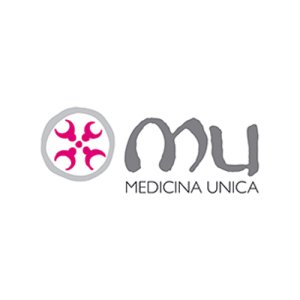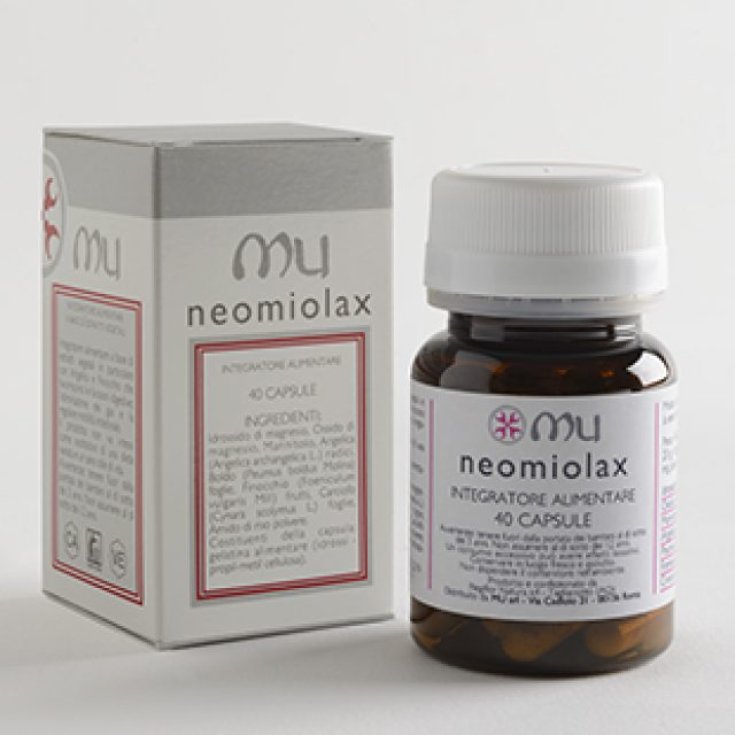Neomiolax Food Supplement 40 Capsules

- Brand: MU Srl
- Product Code: 921192617
- EAN:
- Availability: In Stock
- Purchase 3 items for 18.43€ each
- Purchase 4 items for 18.06€ each
- Purchase 5 items for 17.68€ each
Neomiolax
Capsules
Dietary supplement the synergistic effect of its components can favorably intervene in dysbiotic states with constipation, fermentation processes and intestinal pestrefaction.
Magnesium peroxide powder
It develops oxygen in the intestine, drastically reducing the anaerobic bacterial flora responsible for the fermentation and putrefactive processes in dysbiotic states. It is an osmotic laxative, being difficult to absorb, it retains water in the intestinal lumen with stimulation of peristalsis and an increase in fecal volume.
Magnesium oxide powder
It stimulates the bone by developing the oxygenation of the colon. As magnesium peroxide is neither absorbed nor dissolved in intestinal juices and remaining in the belly it draws water (due to osmotic effect) carrying out a laxative action.
Mannitol powder
It is a substance that is easily found in nature in algae and fungi. The name derives from the manna (Fraxinus sap) from which it can be obtained. Manna contains 50-60% mannitol which retains water in the intestine, favoring an increase in fecal mass and thus stimulating intestinal peristalsis.
Angelica archangelica
It has antidispeptic and spasmolytic action on the digestive tract, especially in the forms with a strong psychosomatic component. The active principle is represented by angelicin, a furanocoumarin with a muscle relaxant and sedative action. It helps to optimize the state of the digestive tract, avoiding meteorism and fermentation with improvement of all functions.
Cynaria scolymus
Artichoke has an eupeptic and stomachic action with an increase in acid secretion and gastrointestinal motility for which chlorogenic acid is held responsible. The choleretic action, scientifically documented, is due to the O-diphenolic fraction.
Peumus boldus
In modern phytotherapy, Boldo extract is an elective remedy for the treatment of dyspeptic disorders of hepato-biliary origin, for hepatic disorders and as an adjuvant in the treatment of constipation. In traditional medicine, boldo leaves have been used as a carminative, reducing the formation of intestinal gas and favoring the elimination of the same.
Foeniculum vulgare
Fennel fruits have always been used in dyspeptic disorders, meteorism and spasms of the gastrointestinal tract. Its aromatic-stimulating properties improve the tone of the gastrointestinal tract. It also increases salivary and gastric secretion and choleresis. The essence of fennel, due to the content in anethole and phencol, is bacteriostatic and therefore properly used to counteract the bacterial processes that can generate meteorism in the gastrointestinal tract.
Ingrediants
Magnesium peroxide powder; magnesium oxide powder; mannitol powder; angelicaarchangelica (angelica) roots; cynaria scolymus (artichoke) leaves; peumus boldus (boldo) leaves; foeniculum vulgaris (fennel) fruits; excipients: rice starch powder.
How to use
Take 2 to 4 capsules in the evening, with plenty of water.
Warnings
Do not exceed the recommended daily dose.
Keep out of the reach of children under three years of age.
Supplements are not intended as a substitute for a varied diet.
For pregnant or lactating women and children it is recommended to consult the doctor.
Format
Bottle of 40 capsules.
Bibliography
- Bastien JW. Healers of the Andes - Kallaway Herbalists and Their Medical Plants. Salt Lake City: University of Utah Press. 1987.
- Bruneton J. Pharmacognosy, Phytochemistry, Medicinal Plants.Paris: Lavoisier Publishing. 1995.
- Schulz V, Hänsel R, Tyler VE. Rational Phytotherapy: APhysicians' Guide to Herbal Medicine. New York: Springer 1998.
- Newall CA, Anderson LA, Phillipson JD. Herbal Medicines: A Guidefor Health-Care Professionals. London: The Pharmaceutical Press 1996.
- Czygan FC: Phytother., 8, 82, 1987.
- Rossi M .: "Finocchio", Herbalist Domani, n.11,1992.
- Wichtl M .: Officinal plants for infusions and herbal teas, OEMF, Milan, 1993.
- Kleessen B, Sykura B, Zunft HJ, Blaut M., Am J Clin Nutr 1997; 65: 1397-402).
- Kruse HP, Kleessen B, Blaut M. (Br J Nutr 1999; 82: 375-82).
- Gibson GR, Beatty ER, Wang X, Cummings JH. (Gastroenterology 1995; 108: 975-82).

